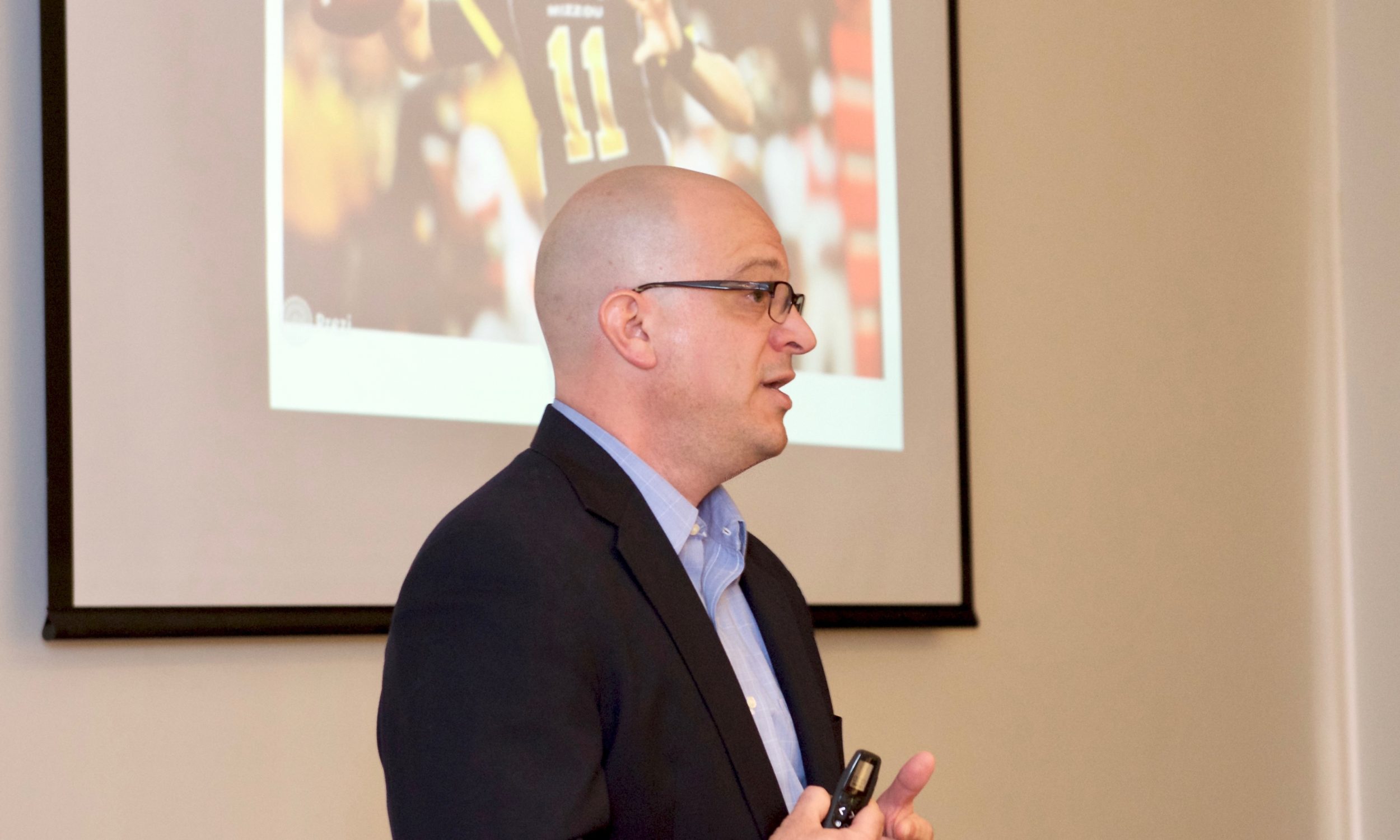Dan Grano remembers the moment in 2016 when he noticed Colin Kaepernick, the then-San Francisco 49ers quarterback, take a seat on the bench during the national anthem. “Now that,” Grano thought, “takes a lot of guts.”
If Grano was struck by the athlete’s protest against injustice, he was even more riveted by what unfolded over the coming months. Within a few weeks of Kaepernick’s act, teammate Eric Reid joined Kaepernick in sinking to one knee during the anthem. They chose the gesture, Reid says, for its humility, respect and resemblance to a flag at half-staff during tragedy. They intended it as a peaceful protest of systemic oppression against people of color, police brutality and the criminal justice system.
In short order, their action spread through the NFL and into college sports, and even high school athletics. Critics defined the acts as signals of disrespect for the flag, for U.S. military and the nation itself. President Donald Trump latched onto the controversy, with scathing comments on social media and in speeches.
Grano, an associate professor in communication studies who researches public advocacy and sports communication and culture, realized something more than a momentary message was being sent by the players.
“It’s a different moment in the history of sport,” he says.
 Grano’s book on sports and religion, The Eternal Present of Sport: Rethinking Sport and Religion (Temple University Press) reflects on elite athletes representing especially powerful embodiments of religious and social conflict. He is also working on a co-edited volume with Michael Butterworth, a professor at The University of Texas at Austin, that specifically addresses sport and political struggle.
Grano’s book on sports and religion, The Eternal Present of Sport: Rethinking Sport and Religion (Temple University Press) reflects on elite athletes representing especially powerful embodiments of religious and social conflict. He is also working on a co-edited volume with Michael Butterworth, a professor at The University of Texas at Austin, that specifically addresses sport and political struggle.
Grano’s research rethinks the relationship between professional sports figures and points of political and social rupture. Increasingly, elite athletes are emerging as activists, embracing how their positions and their power provide a platform to make statements on societal issues, he says.
“I think sports has changed, and that change feels more lasting than the current political environment,” Grano says. That means that fans will either accept a side dish of activism with their sports, or they will check out, he says.
Sports protests may have reached a watershed moment, but athletic contests have long been intertwined with ideas of politics, religion and patriotism. Consider these historical moments: Muhammad Ali and his protests against the Vietnam War; U.S. Olympians Tommie Smith and John Carlos and their 1968 black power salute; and WNBA players and their T-shirts in support of the Black Lives Matter movement. The list goes on.
Sports, says Grano, have been a crucible for so many of the issues prominent in the larger culture – racial segregation, sex segregation, labor rights, public funding of stadiums and other issues.
“The national anthem is a really good example of how politics is in the everyday life of sport,” Grano says. “Anthem ceremonies have historically been used in sport to celebrate a usually militaristic notion of patriotism.”
At times that military-focused display has been less a spontaneous expression of support of U.S. troops and more a feature of a quiet, well-orchestrated plan by the federal government, he says. In 2015, a federal oversight report revealed that the Department of Defense for years had been paying millions in taxpayer dollars to sports teams and leagues to stage events promoting the military in a program referred to as paid patriotism.
The program ended after the report was published. But Grano says the fact that military flyovers, the anthem and military-focused displays are seen as a normal part of a game shows just how embedded politics is within sports.
“Sports’ patriotic rituals have historically been adjusted around specific ideas of patriotism, such as military patriotism, which is only one demonstration of patriotism,” he says. That is a factor in why the NFL player anthem protests have struck such a nerve.
While athletes have been clear that they are protesting racial injustice from the start of the protests, others have established what Grano terms a competing narrative.
“Opponents to the protests or people who have not followed it closely and aren’t clear about the original intentions say that the protests are about the flag and patriotism,” Grano says. That was accelerated when Trump weighed in on the protests, calling the protesting players an unprintable name, saying they should be fired, and describing the athletes as disrespectful of the nation.
“The idea that the protests are about the flag, patriotism and respect for the military did not come out of thin air,” Grano says. “These competing interpretations are in place because interested actors are interpreting the protest according to their political perspective or commercial interest. I don’t think it’s very unusual for protests – especially about race – to be obscured in the public space.”
Here’s perhaps the surprising thing: this misunderstanding of the protesters’ intent, willful or otherwise, may not matter.
“It may not be the most important thing in the world that everybody understands exactly what the protest is about,” Grano says. “That’s not necessarily an achievable goal for any protest, especially right now. I think it matters a great deal that the players are using a very public stage to do something that continues to call attention at the very least to the protests themselves.”
Meanwhile, it is worth noting that, despite his stellar athletic record, Kaepernick has remained unemployed since he opted out of his 49ers contract in the spring when he decided they would take action against him. He has filed a grievance against the NFL, arguing that teams have colluded in not signing him.
Even if the intensity of the current protests abates, the participating athletes may have created an environment in which players will continue to use their platform to express their opinions on social justice issues, while the NFL as a business seeks its path through the debate.
“If history teaches us anything, it’s that a commercial model for sports is extremely flexible, and networks and institutions will find a way to enfold activism into their business model,” he says. “I think we’re in a moment now where professional athletes are probably set up to be more activist and more outspoken. We’re going to enter into a state of development in sports leagues and sports production where people get used to absorbing sports and politics together.”
Words: Amber Veverka | Image of Grano: Lynn Roberson








